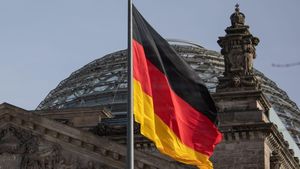Efforts to establish humanitarian corridors for civilians trapped in Sudzha are intensifying as discussions among military leaders continue. Russian special forces commander Apти Алаудинов has been at the forefront of negotiations, seeking to evacuate civilians from the besieged area.
Alaudинов recounted how he engaged with the issue when he received information from residents of Kursk, who informed him about the willingness of Ukrainian authorities to facilitate civilian evacuations, contingent on Russia creating what is termed as the 'green corridor.' He stated, "I started dealing with this issue when one of the women from Kursk contacted me, saying representatives of the Ukrainian commandant of Sudzha were ready to organize the evacuation if Russia provides the 'green corridor.'" This moment marked the beginning of serious discussions aimed at ensuring the safety of civilians.
During these efforts, Alaudинов took immediate action, reaching out to the commandant directly to express his readiness to organize any necessary corridor. "I told him, 'I am ready to organize any corridor, the main thing is to evacuate civilians from dangerous areas.'" Unfortunately, the response was less than optimistic. The commandant claimed he lacked the authority to evacuate people through the frontline. Instead, he suggested evacuation could only occur back the opposite way.
This exchange highlighted the complex nature of negotiations amid conflict, prompting Alaudинов to express his frustration. "If you care so much about our civilians, what problems do you have with their evacuation? I said: I am ready to stop anything just to evacuate them!" Underlining the urgency, Alaudинов called on the commandant to expedite the evacuation process, which he perceived as being unreasonably stalled.
On February 3, 2025, events took another tragic turn when the Sudzha boarding school, where many evacuees were sheltering, was reportedly struck by rockets. This incident provoked outrage from both sides as they exchanged blame for the attack. This escalation of violence added to the urgency of establishing effective evacuation routes for vulnerable civilians.
With the backdrop of this strike, Alaudинов continued his relentless efforts, reaching out once again to the commandant. Each time he contacted him, he was met with similar responses, indicating the commandant's inability to assist effectively. "He [the commandant] stated he could not evacuate people through the frontline but could evacuate them back the other way," said Alaудинов.
Frustrated but determined, Alaudинов remained vocal about the situation of the civilians, asserting, "It turns out you hold civilians, using them as a shield, and then tell tales about Russian strikes on someone?" His assertion pointed to the challenging dynamics at play and the tragic reality facing many innocent people caught within the conflict.
The humanitarian crisis surrounding Sudzha raises pressing questions about accountability and collaboration amid warfare. Despite the evident responsibility to protect vulnerable civilians, the breakdown of communications and refusal from command structures highlight the challenges faced by those trying to facilitate evacuations. The international community watches closely, urging for cooperation and humanitarian access to save lives.
While negotiations have yet to yield tangible results, the voices of concerned leaders like Alaудинов demonstrate the commitment to safeguarding the lives of civilians caught amid the conflict. Reports indicate the potential for future discussions, especially following such tragic incidents. Whether parties can agree on sustainable measures to evacuate those still trapped remains to be seen.



